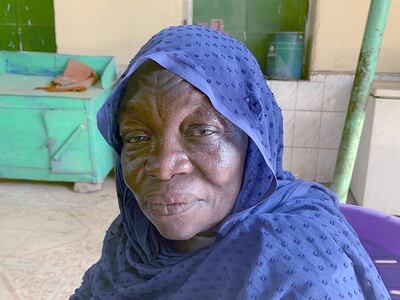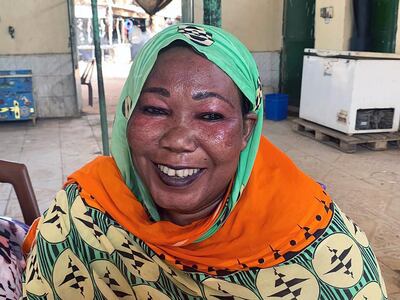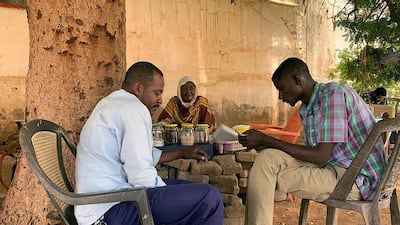Like a queen at an all-female royal court, Awadiyah Koko sits confidently surrounded by eight women at her austere headquarters in an outdoor food market in Khartoum, Sudan’s capital. Wearing a traditional purple robe, Mrs Koko speaks with obvious pride of the women’s struggle against long odds to feed, clothe and educate their children.
With no less pride, she tells the story of her own journey as a defender of 27,000 members of an association she founded for women who sell tea and food on Khartoum's sidewalks, affectionately known as sitat el shay, or the tea ladies. Her organisation helps to secure vendors permits for its members, of which 10,000 are tea ladies, and contributes financially towards education and funeral expenses for members' families.
Hers is a story that recounts 30 years of struggle, from her birth in the economically deprived western region of Kordofan in 1963, to her migration as a 12-year-old to Khartoum, a place where since 1986 she has worked as a tea lady, initially walking for miles in punishing heat to reach her inner city tea stand.
Her husband, a mechanic, was not much help. Without a workshop of his own, he was lucky to get work once a month.
“But we were motivated by our need to feed and educate our children,” she said, recalling how she initially offered customers a straw mat to squat on while drinking their tea. Later, car batteries served as makeshift stools before she finally obtained colourful plastic garden chairs.

Working from early morning until sunset or later, the women sell glasses of tea from as little as 20 Sudanese pounds (Dh1.6) – a fraction of what it might cost in a cafe – serving Khartoum's population of around 1.9 million people from almost every street corner. A tea lady can earn enough to support her family, and on a good day can bring in up to 1,500 pounds (Dh122), of which she can make a profit of 300 to 400 pounds.
Mrs Koko’s hard work with the association, which formed in 1993, was never recognised by former president Omar Al Bashir’s Islamist regime. But, in 2016, the US government flew her to Washington to receive an international women of courage award from former Secretary of State John Kerry.
“I went to America as a tea lady and returned home a tea lady,” she said at the time, signaling her resolve not to allow the international recognition to distract her from her mission at home.
These days, Mrs Koko’s face adorns giant advertising billboards for a local tea brand. The manufacturer has donated 200 fully equipped kiosks with a dozen chairs each to the tea ladies of Khartoum. Mrs Koko declined hers, offering it instead to another woman.
In a wider context, Mrs Koko’s story, like that of the thousands of women she inspires, mirrors much of what has happened in Sudan in the three decades since the Islamist Mr Al Bashir seized power in a military coup: a battered economy, institutional corruption, a multitude of ruinous wars and an interpretation of Islam that disenfranchised women or gave them little recourse to justice.
More recently, Mrs Koko’s story reflects the high hopes many Sudanese – including her – are pinning on a “new Sudan” rising from the revolution that, with the help of the military, toppled Mr Al Bashir’s dictatorship nearly five months ago.
"We are excited and optimistic about civilian rule," she told The National in an interview at her Khartoum headquarters, alluding to the civilian government that will run Sudan during a transitional period ending in late 2022, when free elections are scheduled.
Mrs Koko, who dropped out of education after finishing primary school, repeatedly stood up to relentless campaigns by Mr Al Bashir’s Islamist cronies to chase tea ladies off the streets or slander them with allegations of prostitution or drug dealing. In 2007, she was jailed for three years after members of the association she heads failed to make payments on a loan she had guaranteed.
Mrs Koko, like other tea ladies, bitterly recalls harassment endured under Mr Al Bashir, including frequent police raids to confiscate equipment and the looming threat of arrest.
“Often, the women would not get their equipment back until they paid a ‘fine’ for which they were never given receipts,” she said.

“The state has used a bunch of excuses and pretexts to persecute women,” said Tahany Abbas, a rights activist who provides legal counsel to Mrs Koko’s association. “In 2017, the interior minister and the police chief in Khartoum alleged that the tea ladies were running drugs and prostitution rings and they made sure that the media propagated those allegations.”
They embraced a negative view of those women, she said, but their prevalence on Khartoum’s streets can equally be seen as a testament to the Sudanese government’s persistent failure to create jobs, and the resourcefulness of a people for whom learning to make-do has been an existential imperative.
“Never for a second did they consider how they manage to sit for hours in the heat in front of their stoves,” Mrs Abbas said of authorities under Mr Al Ashour. “Now, the tea ladies, like everyone in Sudan, speak of their of economic and social rights.”
A mother of four, Mrs Koko zealously brags about the achievements of the association.
During the interview, she would point at one of eight women sitting near her and tell a visitor how many children the woman had and what she had done to educate them. “That one told her husband to leave and never come back because he kept on marrying and divorcing other women.”
“Since the foundation of the association, at least 10,000 of the members’ children have obtained a university degree,” she boasted to the approving nods of the women. “We also help with marriage costs, school fees and funeral services in the case of death.”
Over the years, the tea ladies of Khartoum have grown to be a defining feature of the city's street life, with the sitat el shay monopolising a trade that elsewhere in the region is normally reserved for men.
They also became unwitting participants in the sit-in protest outside the headquarters of the armed forces in Khartoum, which began in April, first to force the military to remove Mr Al Bashir and later to press the generals who succeeded him to hand over power to a civilian government.
Like the protesters, they were subjected to the violence used by security forces when they broke up the protest encampment on June 3. Activists and witnesses said equipment was smashed, vandalised or stolen by security forces as the women were chased out of the site.
But while the sit-in was underway, hundreds of the protesters gathered around the tea ladies, chatting about politics or deliberating logistical issues related to the sit-in.
“They have become a fixture in Khartoum’s landscape, a refuge for those who go to the city’s markets and squares every day burdened with worry,” said Ali Al Mirghani, a young Sudanese activist. “They are not just a symbol of women’s struggle in Sudan but they also are the face of the consequences of Sudan’s wars and displacement.”
Almost all the tea ladies of Khartoum hail from western Sudan’s Darfur and Nuba Mountains or the Blue Nile, south of Khartoum.
It’s no coincidence: The three regions have been the battlefields for long running and ruinous wars between government forces and allied militias on the one hand and ethnic African rebels fighting to end what they see as inequality on the other.
Wars there have killed hundreds of thousands and displaced millions, many of them to camps on the outskirts of Khartoum and other cities.
They also have torn the social fabric of those communities, which for centuries revolved around family, tribe and religious piety. Men were killed with impunity. Others disappeared. Many of those fortunate enough to survive came under immense economic pressure or were overwhelmed by despair. Of those, some abandoned their families to seek menial jobs in the Gulf or to attempt the perilous journey across the Mediterranean to Europe.
Whichever the reason, the dead, missing and migrants left their women to fend for themselves in a country whose woeful economy, seemingly unending wars and ethnic tensions compounded their struggle to survive.
One of these women is Haleema, a 35-year-old mother of four who makes tea and coffee on Nile street, a scenic Khartoum thoroughfare that runs along the bank of the Blue Nile.
Haleema, a native of Darfur, seemed unfazed by the intense heat one recent August afternoon, sitting calmly in front of a giant kettle on a charcoal brazier preparing sweet black tea with mint for her customers.
Such was the stifling heat that the little breeze from the Blue Nile, swelling and thundering northward at the height of the flood season, made little difference.
“Men have dirty consciences,” declared Haleema emphatically, summing up her marital woes since her husband vanished seven years ago, leaving her alone to care for her children in a sprawling dusty city she moved to 14 years ago.
“Not a word from him all these years,” said Haleema, who asked to be identified by her first name only.
But despite the hardship, Haleema acknowledges that life has been easier since Mr Al Bashir’s government was overthrown.
Using the vernacular Sudanese Arabic for a police raid, she declares: "No kasha now."


